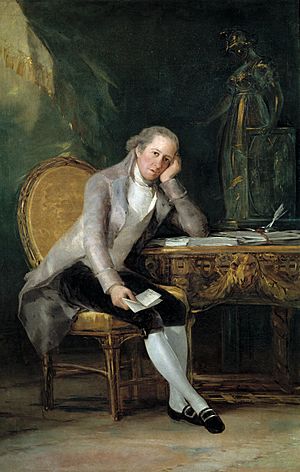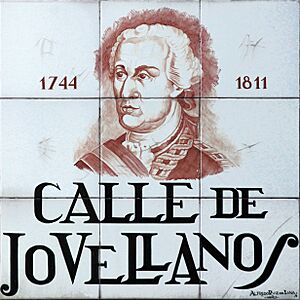Gaspar Melchor de Jovellanos facts for kids
Quick facts for kids
Gaspar Melchor de Jovellanos
|
|
|---|---|

Jovellanos painted by Goya, 1798
|
|
| Born |
Baltasar Melchor Gaspar María
5 January 1744 |
| Died | 27 November 1811 (aged 67) Vega de Navia, Spain
|
| Occupation |
|
Gaspar Melchor de Jovellanos (born Gaspar Melchor de Jove y Llanos, 5 January 1744 – 27 November 1811) was an important Spanish writer, thinker, and government official. He was a key person during the Age of Enlightenment in Spain. This was a time when new ideas about science, government, and human rights became popular.
Contents
Jovellanos's Early Life and Career

Gaspar Melchor de Jovellanos was born in Gijón, a city in Asturias, Spain. He chose to study law. He went to universities in Oviedo, Ávila, and Alcalá. In 1767, he became a judge in Seville.
Because he was honest and skilled, he became a judge in Madrid in 1778. In 1780, he joined the council of military orders. In Madrid, Jovellanos was a respected member of groups that studied literature and science.
His Important Work on Land Reform
In 1787, the Society of Friends of the Country asked Jovellanos to write about a very important topic. This led to his most famous work, Informe en el expediente de ley agraria. This means "A report on the dossier of the Agrarian Law." He finished it in 1794, and it was published in 1795.
In this report, he suggested that the government should change how land was owned. He believed that Spain's wealth came from its farms. He wanted more people to own land and make it productive.
At the time, much of the land was owned by a few rich families or the Catholic Church. There were also common lands that no one owned privately. Jovellanos thought this system stopped farms from growing and making more food.
He was inspired by Adam Smith's book, The Wealth of Nations. This book said that people working for themselves could help the economy. Jovellanos's ideas were not put into practice in Spain right away. However, they did influence thinkers in other places, like New Spain (which is now Mexico). His writings also influenced Alexander von Humboldt, a famous explorer and scientist.
Exile and Return to Public Life
In 1790, Jovellanos was sent away to Gijón for seven years. This was because his friend, Francisco de Cabarrús, fell out of favor with the government. While in Gijón, Jovellanos worked on literary projects. He also helped start a new organization in Asturias. This group aimed to improve farming, industry, and education in his home region.
He was called back to public life in 1797. He turned down an offer to be an ambassador to Russia. Instead, he accepted a job as minister of grace and justice. This was under the powerful minister, Godoy. Jovellanos did not like Godoy's policies. He worked with a colleague, Saavedra, to try and get Godoy removed.
However, Godoy returned to power in 1798. Jovellanos was sent back to Gijón again.
Later Life and Imprisonment
With other thinkers from Asturias, Jovellanos focused on studying his home region. He planned to start projects to study the Asturian language. This included creating an Academy of Asturian Language and an Asturian dictionary. But in 1801, he was put in prison in Bellver Castle on Majorca. This stopped all his cultural projects.
The Peninsular War and His Final Years
The Peninsular War began when the French army advanced into Spain. This war set Jovellanos free from prison. Joseph Bonaparte, who became the Spanish king, offered Jovellanos important positions. But Jovellanos refused them all. He chose to join the Spanish people who were fighting against the French.
He became a member of the Supreme Central Junta. This was a group that helped reorganize the Spanish parliament, called the Cortes Generales. After this was done, the Junta became unpopular. Jovellanos was involved in its downfall.
In 1811, he was welcomed back to Gijón with great excitement. But the French army was still advancing, so he had to leave again. The ship he was on had to stop at Vega de Navia in Asturias because of bad weather. He died there from pneumonia on November 27, 1811.
Pedro de Silva, a former President of Asturias, is a direct descendant of Gaspar Melchor de Jovellanos.
Jovellanos's Writings
Jovellanos's prose works are his most famous writings. These are especially his works on politics and economics. They show his deep thoughts and clear wisdom. He wrote in a very elegant and pure style.
Besides the Ley agraria, he also wrote Elogios (praises). He also kept interesting diaries or travel journals from 1790 to 1801. These journals describe his trips across Northern Spain and were published in 1915. He also published other essays about politics and society.
His poems include a tragedy called Pelayo and a comedy called El delincuente honrado. He also wrote satires and other short pieces. He even translated the first part of the famous poem Paradise Lost.
See also
 In Spanish: Gaspar Melchor de Jovellanos para niños
In Spanish: Gaspar Melchor de Jovellanos para niños
 | Tommie Smith |
 | Simone Manuel |
 | Shani Davis |
 | Simone Biles |
 | Alice Coachman |

